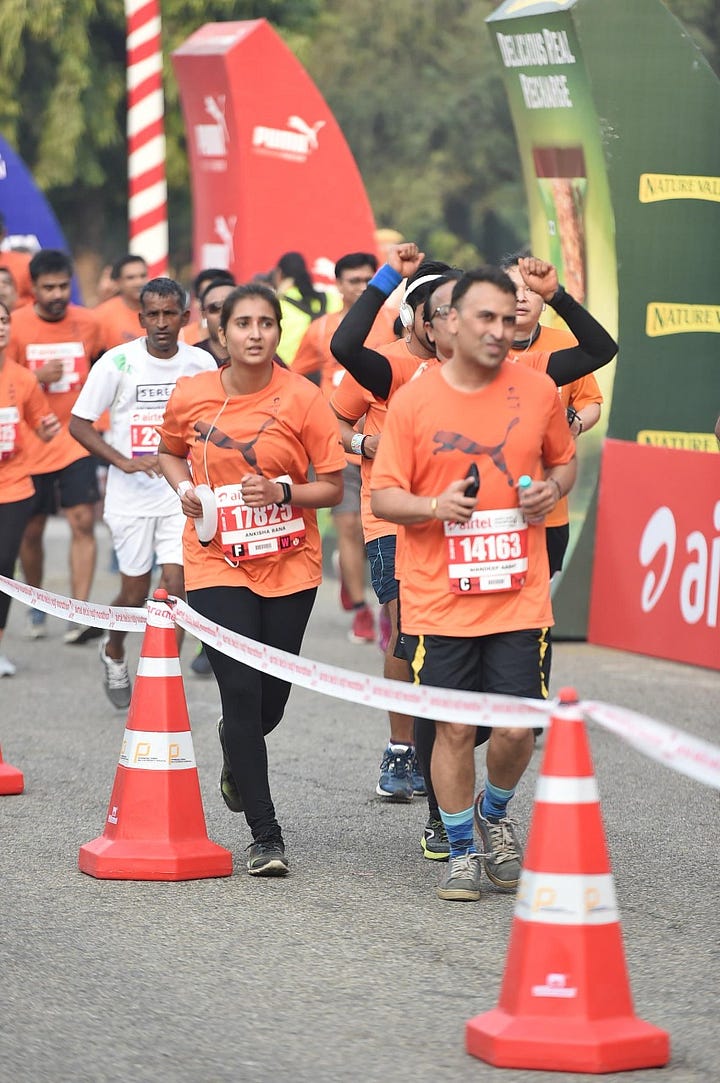A Marathon, A Drive & An Injury That Could've Ruined It All
We're all in a competition. But there are some players that we cannot win against. How do you compete with time?
Hey there Zedites,
This one’s about the race against time.
A Story For You
Competitiveness is a measure of a person’s desire to surpass others. A highly competitive person is more likely to see a situation as a competition, even when there is no explicit winner or loser. For example, a teen may compare their social media popularity to their friends’ rankings, even though there is no explicit reward for having the most followers. The individual’s rivals may not even realize they are competing. (Credits: Good Therapy)
We’ve been competitive ever since we could habitually walk on two legs and forge tools out of natural resources. No, wait, that’s not right.
You’re reading this because you’ve competed with millions of others to be the first to reach the ova. And you won. Yes, that’s a more accurate description.
Competition is in our DNA. Sometimes, it’s voluntary, like athletes competing to win and sometimes it’s involuntary, like the aforementioned example from Good Therapy. The most ubiquitous kind, however, is when you ‘compete with yourself’, or at least that’s what most people think. It’s true that there is only one physical participant in this competition but there is another, more elusive, more intangible player and it’s time. Time leads a person to their death and it’s this competition that keeps us all alive. And if there’s one way to measure this ‘competition’, it’s the act of setting goals.
As a devotee of goal setting, my aim, every year, is to always push the envelope until it’s a tad bit out of my comfort zone. In 2018, it meant completing quarter of a marathon. And it was all because I met this wonderful 50-year-old woman who had recently completed a 100-kilometer run. It left me awe-struck, jealous and worried, all at the same time. Awe-struck because of the sheer will to pull off such a feat at that age, jealous because of my innate competitiveness and worried because I could barely walk a mile without panting. I was 29 years old and 21 kilometers felt like a good place to start.
We exchanged numbers and she gave me all the information to kickstart my running journey. She used a GOQii, a fitness tracker that gives its users a choice of a personal coach, to measure her progress (if you’ve got a fitness goal, this seems like an ideal place to start - backed by an expert). Not an ad. I immediately bought the tracker and subscribed to the service. Here are a few suggestions my coach gave me:
Keeping a log of your actions (maintenance of a running schedule was key).
Doing less, but doing it consistently (DO NOT start dieting immediately or running erratically; instead, each week, set a tiny objective that will gradually help you attain your major goal).
Forgiving yourself for the times you’ve lacked zeal (there is nothing that you can do to make up for a lost day - forgive and forget).
Eating with your body in mind, not your mouth (you truly become what you put into your body).
Finding a partner to help with accountability (no matter how driven you may feel, you tend to lose the rigor - hanging out with physically active friends is one way to start, here’s another).
As I bid farewell to the old me, the new me fared well in the first month. Old me, however, presented new me with an insane amount of challenges because her lazy butt wouldn’t move an inch if it wasn’t absolutely required. At the start of what looked like a long road ahead, I couldn’t jog a kilometer without stopping thrice to catch my breath but I definitely was making progress every day. It was slow, but it was prominent. With a consistent diet and a consistent running schedule, I actually found my groove in the second month.

The marathon was in November and by July, I was quite pleased with my ability to pant only once after having run 2 kilometers. I felt better, ran faster and had lesser fatigue than when I started out. But there are accidents, waiting to happen, on an open road. I tripped during one of my sprints which sent shockwaves to my ankle, but I shrugged it off like it was nothing and continued running.
The next morning, I woke up with a swelling twice the size of my ankle. It was excruciating. After a couple of tests and X-rays, the doctor broke the news to me - I had torn a ligament. What timing. All that preparation for nothing? I informed my coach who did her best to cheer me up but I didn’t need consoling or rational reasoning at that point. I was just wanted to run.
The one month break could have been easily been the death of my motivation to complete the marathon. The race against time wasn’t going well at all. It was gaining that lead over me. I even thought about cancelling my registration (quit early to not let time win) but my coach persisted and demanded that we keep regular meetings so that my mind doesn’t wander off. We didn’t do much in the meetings per se - she just made me meditate. My accountability partner also came by to practice some upper-body workouts to get some part of me moving at least.
The doctor gave me the green light to resume training after three weeks, instead of a month. Elated that I had saved a week and that I wouldn’t have to completely start over (thanks to muscle memory), I started walking slowly the very next day. It hurt in the beginning but I kept picking up the pace until I could start walking without wobbling to the side.
Walking, in no time, turned to jogging and jogging turned to running. I was back at 90% in about three months, with very little time for the D-Day. Those 4 months were intense but I managed to pull it off.
And yes, with great difficulty, I completed the marathon.


A Story From You
It’s the belief that you can change that helps you in making the change. Effort without belief will lead to zilch.
What have been some of the extraordinary feats that you have achieved?
Looking forward to hearing your amazing stories. Mail us at aamer@zedmedium.com if you’re unable to comment on Substack.
Waiting with bated breath,
Ankisha





